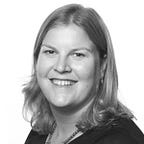The Hand that Gives
 In March of my senior year of college, I walked into my advisor’s office and told him that after graduating as an anthropology major, I wanted to find a job where I could “do good and travel abroad.” He suggested I go into international development, so off I went to Washington, DC, thinking I could use my liberal arts skills to improve the lives of the poor around the world.
In March of my senior year of college, I walked into my advisor’s office and told him that after graduating as an anthropology major, I wanted to find a job where I could “do good and travel abroad.” He suggested I go into international development, so off I went to Washington, DC, thinking I could use my liberal arts skills to improve the lives of the poor around the world.
I imagined myself spending time in villages helping people get access to clean water, building health clinics, and improving farming techniques. But in reality, I found myself sitting at a desk in Washington making hotel reservations and processing expense reports.
Eventually, I was able to get out from behind my desk, and about a year into my time working with an international development contractor I had the opportunity to travel to Santa Cruz, Bolivia. My assignment was to interview families, organizations, and team members about the effectiveness of a ten-year forestry project that was winding down. My dreams of saving the world weren’t playing out as I’d expected. Instead of hearing that our company was seen as a hero amongst the Bolivian foresters, I learned that the local community had no intention of sustaining the activities once the funding ended.
I came back from talking with the foresters, took a look at the smart expats sitting in their offices alongside idealistic young college graduates like me, and started to wonder if these were necessarily the best people to design solutions to the challenging issues the foresters were facing.
I spent another four years in Washington and became more and more disillusioned by the expat-led, top-down approach to development that I saw. I wondered about different ways of doing things and about what the private sector might have to say to the big challenges of poverty. So, I went to business school. And that education, along with experiences working and living in India, Kenya, and Silicon Valley, have made me believe that market forces can help change lives.
I’ve dedicated my work to tackling global poverty because I find the conditions in which so many people are forced to live to be unfair and unnecessary. But that disillusionment that I felt, and sometimes still feel, with the business of international aid is real. It’s what made me start asking how we might make collaboration with the poor horizontal rather than vertical. A West African proverb holds that “the hand that gives is always on top.”
How might we turn that giving hand and put it up to our ears to listen?
For decades, there has been a small but vocal group of people advocating for participatory approaches to development. Robert Chambers’s book Rural Development: Putting the Last First was published in 1983 and was a real call to action for development practitioners to become more human-centered and better listeners in their work.
Since the early 1980s, other participatory approaches have emerged including appreciative inquiry, positive deviance, and constituent voice. The one that I discovered and now practice is human-centered design. In 2007, I joined IDEO to lead its emerging social impact domain. At the time, I had a limited understanding of design but felt like trying to see if human-centered design (HCD) could be an effective approach to poverty was worth a shot. Now, eight years later and with the creation of IDEO.org, I strongly believe in the power of HCD and creative problem solving skills.
Human-centered design, like many other participatory approaches, is grounded in the notion that we must start with an understanding of the needs of the people we’re working with, see them truly as partners, and work with them to develop solutions. Often, while practicing human-centered design, the trick is less in the creation of an innovative new solution, but in designing within the complexity of a system. Human-centered designers ask questions, listen, learn, test things out, get feedback, iterate, and repeat.
Now, after 17 years working in international development tackling “Other People’s Problems” I realize how naïve I was when I started. And though I am self-critical about the simplicity with which I started my career, I know that I had to mature through the simplicity to get to the understanding of complexity that now guides my work.
Today, I encourage young people to spend time abroad, in part because I don’t believe it’s possible to turn away from the injustice of poverty once you get to know the people who live in it. It’s important to spend time really seeing people and learning about their lives. We may not all commit our lives to redressing poverty, but being up close to it is an experience that changes people.
So, before you get your passport, here are a few pieces of advice I would give to people who are curious to explore places you may have missed in your junior year abroad:
- Be a learner, not a hero. Before heading abroad, check your intentions. Are you going because you believe you have ideas to share and solutions to introduce? Or are you going because you really want to listen and learn and immerse yourself in the complexity?
- Be a listener, not a giver of advice. Instead of landing with answers to the complex, intractable challenges, engage people on the ground in conversations. Visit their homes and their workplaces, ask them questions, and share something about your life with them.
- Be a bridge, not a beacon. Share your creative ideas, but be open to an equal exchange with people who know their own context best. Seek to connect your world of resources to those living without. Work with community-based organizations to write grant proposals, raise money for their organizations, or connect them with press opportunities. For many of us, our networks are the most important asset we can bring. Imagine how you can leverage your networks rather than thinking of yourself as a solution-creator.
What is certain is that the world can use the passion and creativity of well-meaning, hard-working people — whether in Baltimore or Bukavu. But to ensure that we aren’t paving an infernal road with our good intentions, we need to remember to work with people, not for them.
The Spanish poet Antonio Machado once wrote that we make the road by walking. So I ask you: Will you walk alone? Or will you walk alongside someone who may be just as creative and passionate as you are?
